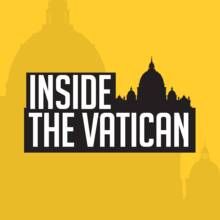Last week at the Synod on Synodality, delegates deliberated on contentious issues in the Catholic Church, including the inclusion of L.G.B.T. people, the global migration crisis, women's roles in the church's mission, and the plights of the world’s most impoverished people. The question of women's ordination to the diaconate also gained prominence as participants explored the issue of women's authority within the church. At the start of the Synod's third week, a synod organizer told Colleen, “This is where this gets interesting.”
On this week’s episode of “Inside the Vatican,” host Colleen Dulle and veteran Vatican correspondent Gerard O’Connell sit down in Rome for their first face-to-face podcast in four years to cover what’s being said, and how participants are mitigating the pitfalls of polarization as they converse.
Colleen and Gerry discuss how the confidentiality expected of synod participants has helped to facilitate respectful conversation around hot-button issues at the synod. The discussion on L.G.B.T. people focused on a “question of truth versus love,” explained Colleen, which allowed for “dynamic discussion.” Gerry explains that, beyond any particular issue, the key theme of the discussion on communion was inclusion, which allowed the conversation to range from the discussions around sexual identity and relationships to inclusion of migrants within the church.
After concluding their discussion on communion, synod participants initiated their discussion around the theme of “co-responsibility in mission,” or as Colleen put it, “How can we better share gifts and tasks in the service of the Gospel?” This opened up dialogue on the role of women in the church, and although conversations are ongoing, there was consensus that “there must be greater recognition of the ministry, the role that women can play in the church,” said Gerry.
[Listen and subscribe to “Inside the Vatican” on Apple Podcasts and Spotify.]
In the second half of the show, Colleen and Gerry discuss the Vatican’s response to the ongoing situation in Israel and Gaza. “The Vatican is walking a delicate diplomatic line here,” said Colleen, explaining that Holy See diplomacy would not want to come down on any particular side. The Vatican has always maintained its advocacy for a two-state solution and special status for Jerusalem, a sacred city for the Abrahamic faiths: Islam, Judaism and Christianity. Pope Francis has appealed to Hamas to release Israeli hostages and urged for humanitarian corridors to be made in Gaza to bring in emergency relief aid and help refugees escape. He has also called for a day of prayer, fasting, and abstinence for peace on October 17, the day this podcast airs.
Links from the show
- Pope Francis: My friend could be a victim of Hamas attack
- Pope Francis calls for respect of human rights ‘above all in Gaza’
- Meet the laywoman who led the U.S. synod process
- The lay woman bringing Catholic social teaching to the heart of the Vatican
- On the Ground in Rome: Reporting on the synod—and tuning out the noise
- Pope Francis publishes new apostolic exhortation on St. Thérèse of Lisieux







